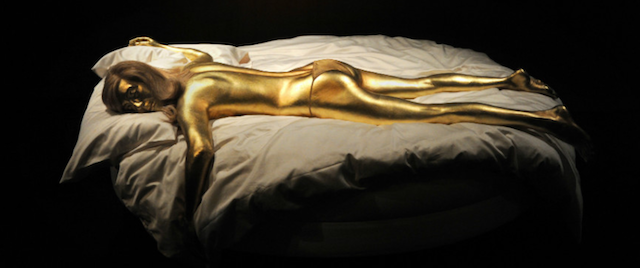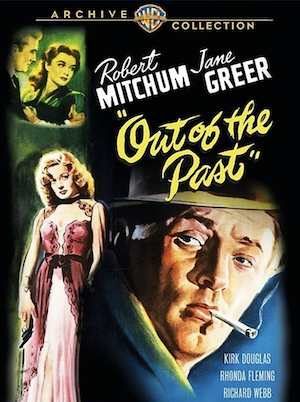“Gold, Mr. Bond.”

There are no Swiss banks in Goldfinger although “Goldfinger, in ready money, is the richest man in England. In Zürich, in Naussau, in Panama, in New York, he has twenty million pounds’ worth of gold bars on safe deposit.” But Goldfinger uses Switzerland as the hub of his gold trafficking (which was illegal at the time in some European countries). There he has a discreet plant where he melts down car parts made of solid gold to then discreetly bank them or ship them on. Switzerland never had capital controls that prevented the free flow of gold or other precious metals, and this makes it even today the world’s first market for gold. In the movie, Goldfinger uses this Swiss freedom to his advantage.
Colonel Smithers explains the British secret service’s interest for Mr Goldfingers’ operations during the dinner at the Bank of England:
‘The great thing to remember about gold is that it’s the most valuable and most easily marketable commodity in the world. You can go to any town in the world, almost to any village, and hand over a piece of gold and get goods or services in exchange. Right?’
Colonel Smithers’s voice had taken on a new briskness. His eyes were alight. He had his lecture pat. Bond sat back. He was prepared to listen to anyone who was master of his subject, any subject. ‘And the next thing to remember,’ Colonel Smithers held up his pipe in warning, ‘is that gold is virtually untraceable. Sovereigns have no serial numbers. If gold bars have Mint marks stamped on them the marks can be shaved off or the bar can be melted down and made into a new bar. That makes it almost impossible to check on the whereabouts of gold, or its origins, or its movements round the world. In England, for instance, we at the Bank can only count the gold in our own vaults, in the vaults of others banks and at the Mint, and make a rough guess at the amounts held by the jewellery trade and the pawn-roking fraternity.’
‘Why are you so anxious to know how much gold there is in England?’
‘Because gold and currencies backed by gold are the foundation of our international credit. We can only tell what the true strength of the pound is, and other countries can only tell it, by knowing the amount of valuta we have behind our currency. And my main job, Mr Bond’ – (Colonel Smithers’s bland eyes had become unexpectedly sharp) – ‘is to watch for any leakage of gold out of England – out of anywhere in the sterling area. And when I spot a leakage, an escape of gold towards some country where it can be exchanged more profitably than at our official buying price, it is my job to put the CID Gold Squad on to the fugitive gold and try get it back into our vaults, plug the leak and arrest the people responsible. And the trouble is, Mr Bond – (‘Colonel Smithers gave a forlorn shrug of the shoulders) – ‘that gold attracts the biggest, the most ingenious criminals. They are very hard, very hard indeed, to catch.’
‘Isn’t all this only a temporary phase? Why should this shortage of gold go on? They seem to be digging it out of Africa fast enough. Isn’t there enough to go round? Isn’t it just like any other black market that disappears when the supplies are stepped up, like the penicillin traffic after the war?’
 ‘I’m afraid not, Mr Bond. It isn’t quite as easy as that. The population of the world is increasing at the rate of five thousand four hundred every hour of the day. A small percentage of those people become gold hoarders, people who are frightened of currencies, who like to bury some sovereigns in the garden or under the bed. Another percentage needs gold fillings for their teeth. Others need gold-rimmed spectacles, jewellery, engagement rings. All these new people will be taking tons of gold off the market every year. New industries need gold wire, gold plating, amalgams of gold. Gold has extraordinary properties which are being put to new uses every day. It is brilliant, malleable, ductile, almost unalterable and more dense than any of the common metals except platinum. There’s no end to its uses. But it has two defects. It isn’t hard enough. It wears out quickly, leaves itself on the linings of our pockets and in the sweat of our skins. Every year, the world’s stock is invisibly reduced by friction. I said that gold has two defects.’
‘I’m afraid not, Mr Bond. It isn’t quite as easy as that. The population of the world is increasing at the rate of five thousand four hundred every hour of the day. A small percentage of those people become gold hoarders, people who are frightened of currencies, who like to bury some sovereigns in the garden or under the bed. Another percentage needs gold fillings for their teeth. Others need gold-rimmed spectacles, jewellery, engagement rings. All these new people will be taking tons of gold off the market every year. New industries need gold wire, gold plating, amalgams of gold. Gold has extraordinary properties which are being put to new uses every day. It is brilliant, malleable, ductile, almost unalterable and more dense than any of the common metals except platinum. There’s no end to its uses. But it has two defects. It isn’t hard enough. It wears out quickly, leaves itself on the linings of our pockets and in the sweat of our skins. Every year, the world’s stock is invisibly reduced by friction. I said that gold has two defects.’
Colonel Smithers looked sad. ‘The other and by far the major defect is that it is the talisman of fear. Fear, Mr Bond, takes gold out of circulation and hoards it against the evil day. In a period of history when every tomorrow may be the evil day, it is fair enough to say that a fat proportion of the gold that is dug out of one corner of the earth is at once buried again in another corner.’
Colonel Smithers to James Bond in Ian Fleming’s Goldfinger (1959)

Published by 24hGOLD ~ August 27, 2008








